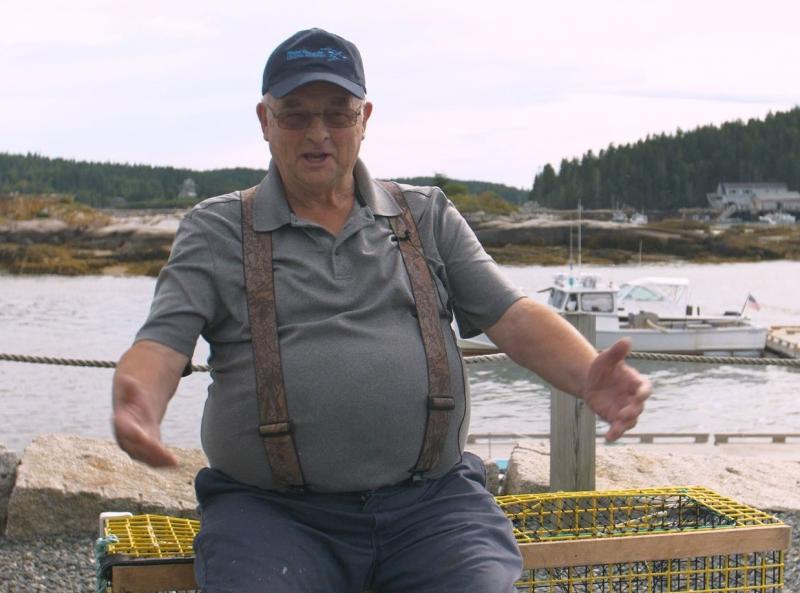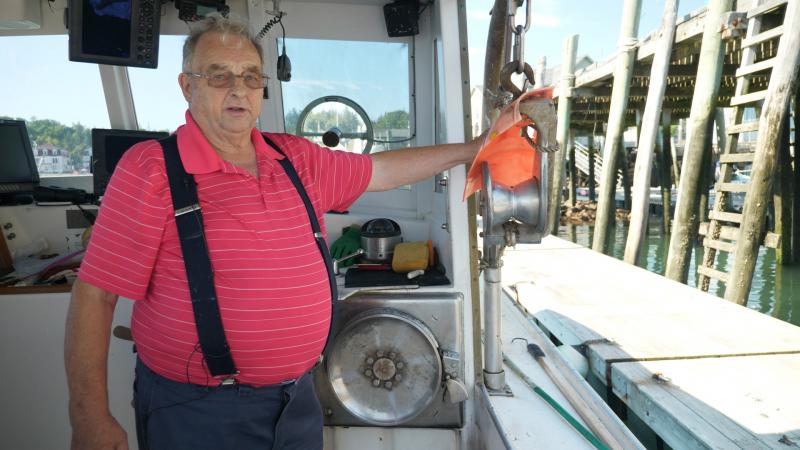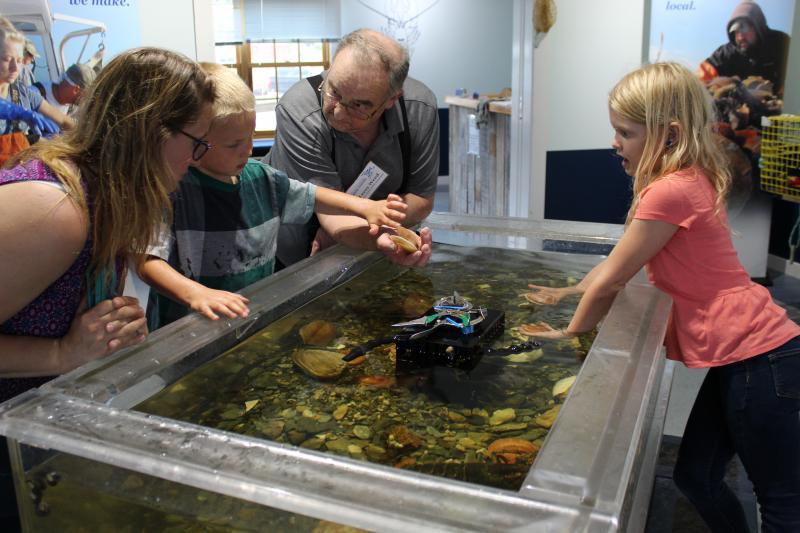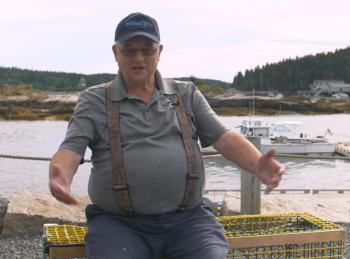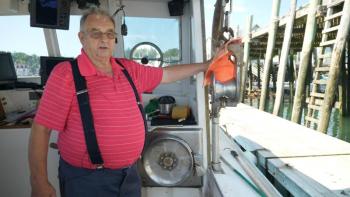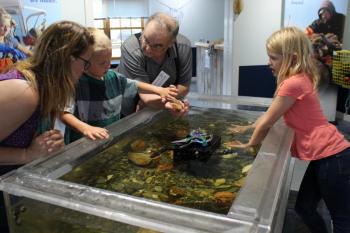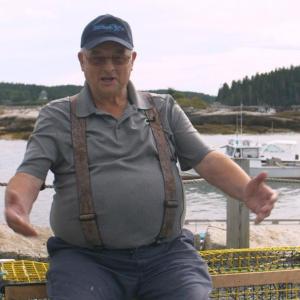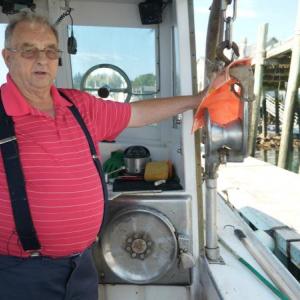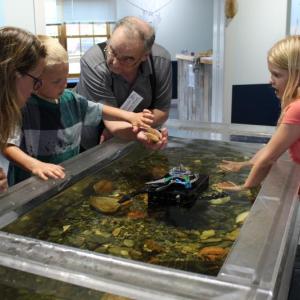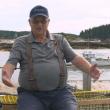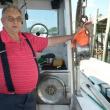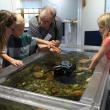Have a burning question about lobstering? Ask Leroy!
STONINGTON—My neighbor, a long-time lobsterman, told me the other day: “There’s this guy you gotta check out, named Leroy. Friend told me about him. On YouTube, old guy like me whose been in the business all his life. He’s answering people’s questions and I hear he’s pretty funny.”
He was talking about Leroy Weed, 79, a Deer Isle lobsterman who is getting some statewide and national attention as a spokesman for the lobstering life in an online video series by the Maine Center for Coastal Fisheries, where he answers any and all questions about fishing and commercial fisheries in Maine.
Last summer, the Center hired Leroy to be an educator in their interpretive center in Stonington Harbor called “Discovery Wharf.” Leroy greeted visitors, answered questions, and told stories to more than 7,000 visitors. You could say Leroy was one of the Center’s biggest attractions. He loved his role and told Executive Director Paul Anderson it was the “best job he ever had.”
But with COVID-19 changing the Center’s summer plans, they decided, instead, to ask their visitors to call in questions for Leroy and sit him down in front of a camera with a microphone to answer them. The results have been a viral hit on the Internet called “Ask Leroy.”
The big part of Leroy’s appeal is his dry and cheeky humor. In Episode 5, the video starts with Leroy pressing the wrong button on an Amazon Echo speaker, when Alexa pipes up with a complaint that she can’t connect to the WiFi network, to which Leroy answers: “Is that a question or what? You send Alexa down there and I’ll straighten her out. She’ll be connected to sumpin–I don’t know what.”
Weed grew up in a family of 10 children on Deer Isle, which he explains in Episode 10.
“Growing up was very rural, a lot of big families on the island, six to 10 kids per family was common,” he explained. “Everybody worked for the group. You worked for the good of everybody and working the water was our mainstay. Scalloping was a winter project and most of the lobster fishermen stopped in November and then went scalloping. Lobster wasn't worth a whole lot back then, maybe 30 cents a pound. We worked year-round—daylight at 3:30 a.m. until it got dark. It was hard work, but we learned how to be self-sufficient. We knew how to dig clams, catch scallops, mussels. Important staples. And we built our own traps, half rounds. We learned and how to work on the house, how to butcher animals, pigs, chicken, ducks, geese, and goats. We could hunt...could pick blueberries, blackberries, apples. There was never a shortage of something to do. You never forgot the lessons because they were hard lessons, and you stayed at it until you learned it.”
We decided to ask Leroy a couple of questions of our own.
Q: Some lobstermen are annoyed by tourist questions—after a lifetime of them, what made you want to jump right in and answer them?
A: Well, I don’t tell them how much money I make, and that’s the only one I won’t answer. Some people will get upset if you ask how much money they earn, and then they’ll just stop answering questions. They’ll say ‘Yup, I gotta go, can’t be bothered, and that’s the end of that.’ So, if you want to know what’s involved in how lobstering works, we can answer that. I don’t know all the ins and outs of it, but I’ve been doing it for 58 years, so it’s a learned profession—learn by doing. We’ve had questions on how boats are designed, how a trap works, how to cook up a lobster and get the meat out. Well, wouldn’t you know, we had all kinds of calls from restaurants too! Some chefs don’t know how to get all the meat out of a lobster. They just rip the claws off and throw the rest of it away. We’re gonna do a video to show them how to use the whole lobster. You grow up the way I did, you eat everything but the eyeballs.
Q: Speaking of, I was most interested in learning how you grew up on Deer Isle...
A: Well, I haven’t growed up yet—I’m still a kid! If you grow up, you get serious, you see? And then you won’t have any fun...
Q: I was going to say, with the pandemic and even before then, there’s been this resurgence in learning self-sufficient outdoor and homesteading skills—what do you think of that?
I think that it’s a good thing—if it drives them, go for it. My son goes fishing and tonight, he brought in a big cusk. That’s what we’ll have for supper tomorrow night. I got seven grandkids. And my grandson went lobstering with me. He wanted money for college, so he got on the boat and earned it.
Q: What’s the craziest questions you’ve ever gotten from the public?
A: Well, some of ‘em have asked me, ‘How do you know there’s lobsters in the traps?’ so, I tell ‘em, ‘We got this fiberoptic line; we look down the line and see if he’s in there.’ The other question we get a lot is ‘Why are the boats all parked in the same direction?’ And I just say, ‘So, they can all get out and not run into each other.’ But, then, I follow up with them and explain it and say ‘It’s the way the wind and the tide turn them.’
According to the Anderson, the Center just completed Episode 11 right now and plan on continuing through October. They have the videos posted on their website, on their YouTube channel, and on Facebook. The series has been very popular with some episodes racking up nearly 20,000 views and their YouTube channel gaining more than 500 subscribers.
To see the individual episodes visit: https://coastalfisheries.org/media/videos/
Kay Stephens can be reached at news@penbaypilot.com
Event Date
Address
United States

